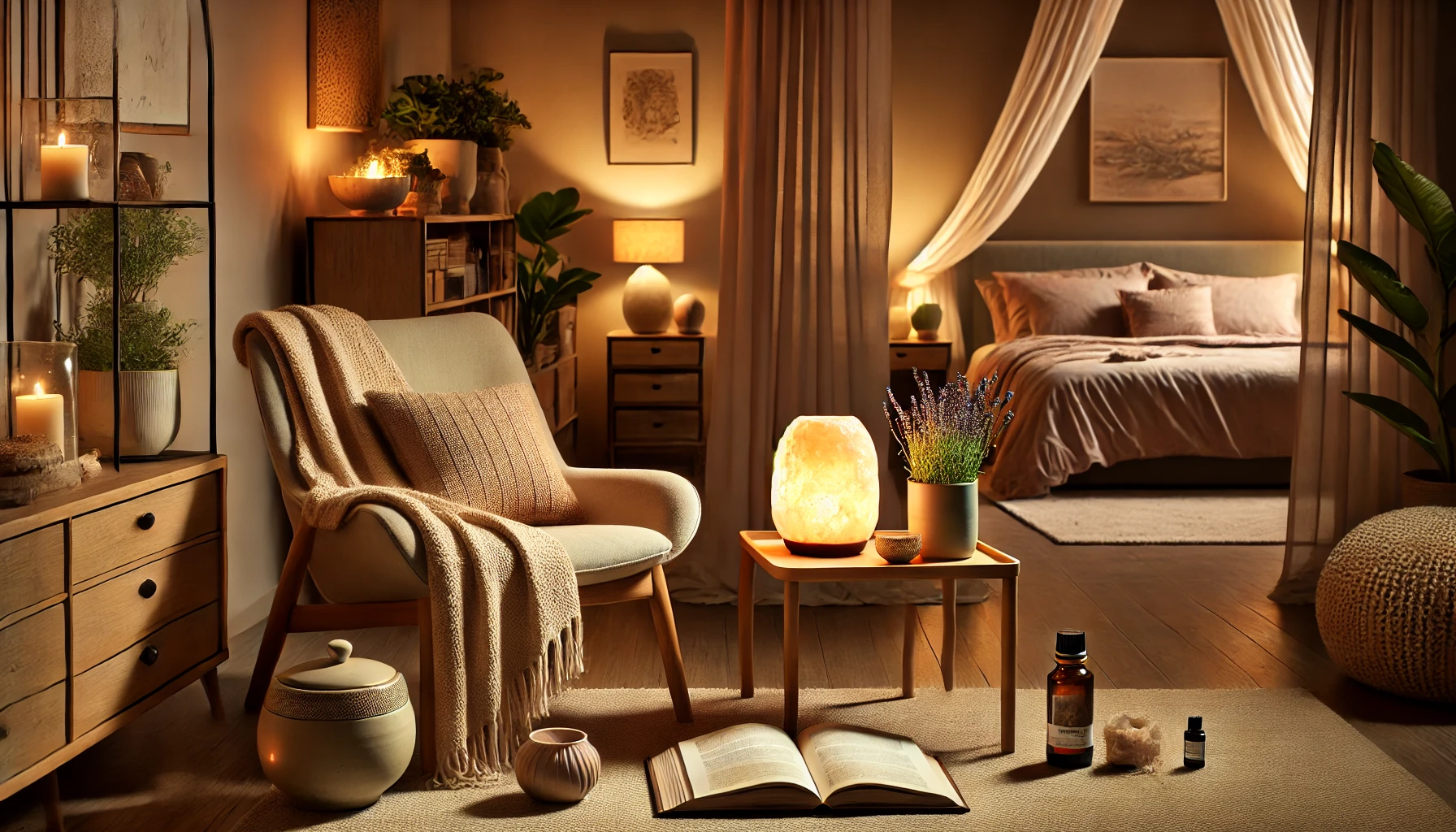An intentional evening routine helps you release the stress of the day, calm the mind, and prepare for restorative sleep. With Feng Shui, you can shape both your space and habits to promote relaxation, emotional balance, and physical renewal. By transitioning your home into a tranquil environment each evening, you create a sacred rhythm that supports deeper rest and overall wellness.
1. Shift from Yang to Yin Energy in the Evening
Feng Shui teaches that Yang energy (bright, active, outward) dominates the day, while Yin energy (quiet, soft, inward) should take over in the evening.
To support this shift:
- Dim the lights after sunset
- Lower the volume of music and conversation
- Engage in calming activities like journaling, stretching, or tea rituals
- Transition from screens and stimulation to rest and reflection
2. Create a Wind-Down Zone for Evening Rituals
Set aside a specific space where you can unplug and settle in.
- Use a corner with soft lighting, cozy seating, and minimal distractions
- Include items like a blanket, essential oil diffuser, or a cup of herbal tea
- Decorate with neutral tones, organic textures, and comforting objects
- Keep this space sacred—avoid work, electronics, or multitasking here
3. Use Aromatherapy to Soothe and Calm the Mind
Scents have a direct effect on your nervous system.
- Diffuse lavender, sandalwood, or chamomile essential oils in your evening area
- Place a sachet of calming herbs in your pillow or near your bed
- Use incense or a calming spray before meditation or stretching
- Avoid citrus or energizing scents in the evening hours
4. Declutter and Clean Lightly Before Bed
Tidying up is a symbolic way to close the day with clarity.
- Put away items from daily activities—books, dishes, clothing
- Clear your nightstand and make your bed feel fresh and welcoming
- Wipe down kitchen counters or do a 5-minute sweep to keep energy light
- Keep clutter out of sight, especially in the bedroom
5. Soften Lighting to Encourage Restfulness
Bright lighting keeps your brain alert—switch to gentle glow instead.
- Use table lamps, salt lamps, or fairy lights instead of overhead fixtures
- Install dimmer switches to transition more gradually from light to dark
- Use candles or lanterns for reading or quiet moments
- In bedrooms, avoid blue-white bulbs; choose warm tones for sleep preparation
6. Prepare the Bedroom as a True Retreat
Your bedroom should be the most Yin-focused room in your home.
- Use soft linens, calming colors, and a clutter-free layout
- Position your bed away from direct door alignment, with a solid headboard
- Keep electronics out of the room, or turn them off an hour before sleep
- Add comforting symbols, such as healing crystals, calming artwork, or a photo of loved ones
7. Connect with the Earth Element for Stability
Earth energy soothes the nervous system and helps ground emotions.
- Incorporate stone, clay, or ceramic materials into your decor
- Use earth tones like warm beige, tan, terracotta, or soft browns
- Place a small bowl of natural stones, a crystal, or potted plant in your evening space
- Sit or stretch on the floor for a deeper connection to grounded energy
8. Practice Breathing or Gentle Movement
Even a few minutes of physical or meditative practice can help signal the body to relax.
- Try yin yoga, stretching, or tai chi for 10–15 minutes
- Sit quietly and practice deep breathing or box breathing
- Use guided meditations or sound healing to calm the mind
- Keep a small yoga mat or meditation cushion in your wind-down zone
9. Use Water Rituals to Release the Day
Water symbolizes cleansing, letting go, and emotional healing.
- Take a warm bath or shower with calming oils or Epsom salt
- Rinse your face and hands mindfully as a symbolic act of clearing the day’s energy
- Keep a bowl of water with floating petals or a small tabletop fountain in your space
- Sip herbal tea to help release tension and support sleep
10. Journal or Reflect to Close the Day with Intention
Evening writing can offer release, gratitude, and mental clarity.
- Keep a small journal beside your bed to write down thoughts, dreams, or intentions
- Try prompts like “What did I let go of today?” or “What am I grateful for?”
- Write a single positive affirmation to sleep with, such as “I rest with peace in my heart.”
- Avoid overthinking—focus on short, gentle reflection
11. Minimize Stimulation in the Final Hour
Too much sensory input late in the day disrupts restful energy.
- Turn off phones, tablets, or TV at least 30–60 minutes before bed
- Avoid intense conversations or work-related tasks in the final hour
- Listen to soothing music, white noise, or silence
- Let your energy and environment move into stillness
12. Keep the Evening Routine Consistent and Sacred
Consistency builds rhythm and trust in your space.
- Begin your wind-down routine at the same time each evening, if possible
- Let the steps be gentle and enjoyable, not rigid
- Honor this time as sacred—even 30 minutes of intentional calm can shift your whole night
- Adjust seasonally: add cozy layers in winter, open windows in spring, follow nature’s rhythm
Final Thoughts: Creating a Feng Shui Evening Routine
Feng Shui reminds us that our homes are living systems—when we bring mindful design and consistent ritual to our evenings, we invite peace, clarity, and renewal.
Your evening routine doesn’t need to be elaborate. What matters most is creating a supportive, sensory environment that helps you release, reset, and rest. With just a few small changes, your home can guide you gently into each night with harmony.
